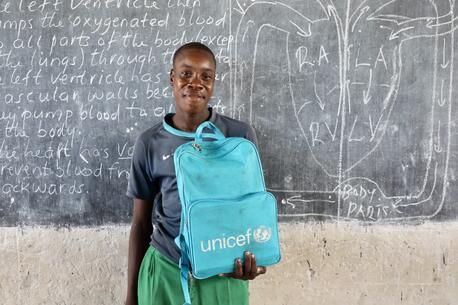
Celebrating Earth Day Amidst COVID-19
Although advocates cannot physically come together this Earth Day, current circumstances illustrate the need to work together to address crises that defy borders, such as climate change.
Today we celebrate the 50th anniversary of Earth Day, an international day of climate action. This year, amidst the COVID-19 pandemic, it is more important than ever to harness the power of the international community in the face of immense global challenges. Although advocates cannot physically come together this Earth Day, current circumstances illustrate the need to work together to address crises that defy borders, such as climate change.
Greater international cooperation is needed to protect children and safeguard their futures
In the words of UNICEF Executive Director Henrietta Fore, “The effects of a warming planet hit children first and worst,” and as such, ensuring children can grow up in a safe and clean environment is a top global priority for UNICEF. If we don’t act now to limit emissions, by 2040 an estimated 25 million more children will be malnourished due to climate change and approximately 600 million will live in areas with extremely limited water resources. UNICEF is working to reduce the impacts of climate change around the world by building climate-smart health centers, schools and WASH services, as well as by reducing pollution and engaging children and young people as agents of change. However, greater international cooperation is required to protect children and safeguard their futures.
“The effects of a warming planet hit children first and worst.” — Henrietta Fore, UNICEF Executive Director
While COVID-19 may not have been directly caused by climate change, there are strong parallels showing their solutions are linked. Environmental degradation is a major underlying risk factor associated with the spread of infectious disease, and studies show that climate change will increase the number and frequency of emergencies, such as pandemics like COVID. These risks are exacerbated for the poorest children and families who live in polluted environments with little to no access to safe drinking water, basic sanitation and hygiene — all crucial to preventing exposures.
Earth Day provides a timely call to evaluate the ways in which we approach crises that defy borders. The pandemic has highlighted and reinforced the value of cooperation not only between countries, states and cities, but also between the public, private and civil society sectors.
Global problems require global solutions, and climate change is no exception

On September 20, 2019 in New York City, Aminah El-Amin and a group of her classmates from the Institute for Collaborative Education, join other youth climate activists in a demonstration calling for global action to combat climate change. © UNICEF/UNI206987/Chalasani
The Paris Agreement, the United Nations climate change compact, represents the best international effort to reduce emissions and protect children from the threat of climate change. On Earth Day 2016, the United States signed the Agreement, alongside 175 other countries, and committed to reduce greenhouse gas emissions by at least 26% before 2025. To ensure the United States remains a party to the Agreement and upholds these commitments, this Earth Day we are calling on UNICEF advocates to express their support for the International Climate Accountability Act (S.1743).
The global community has proven it can unite for action in a time of crisis. Climate change must be treated like the global emergency that it is by all nations, for the sake of every country’s future generations.
Raise your voice and ask Congress to protect children from the impacts of climate change today.
Top photo: On March 29, 2015, children play on a fallen tree that came down during Cyclone Pam on March 14, crushing a car on the outskirts of Port Vila in Vanuatu. © UNICEF/UN055824/Sokhin
HOW TO HELP
There are many ways to make a difference
War, famine, poverty, natural disasters — threats to the world's children keep coming. But UNICEF won't stop working to keep children healthy and safe.
UNICEF works in over 190 countries and territories — more places than any other children's organization. UNICEF has the world's largest humanitarian warehouse and, when disaster strikes, can get supplies almost anywhere within 72 hours. Constantly innovating, always advocating for a better world for children, UNICEF works to ensure that every child can grow up healthy, educated, protected and respected.
Would you like to help give all children the opportunity to reach their full potential? There are many ways to get involved.



